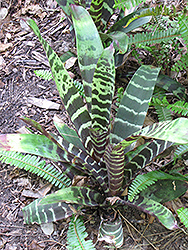Johnson Brothers Plant Finder
Black Chantini Bromeliad
Aechmea chantinii 'Black Chantini'
Plant Height: 24 inches
Flower Height: 3 feet
Spread: 24 inches
Sunlight:
![]()
![]()
Hardiness Zone: 9b
Other Names: Urn Plant, Vase Plant
Description:
A popular plant producing a water tight rosette of leathery, silver striped, burgundy to black leaves that arch gracefully outward; sends up spikes of yellow flowers with deep red bracts; a stunning, eye catching accent
Ornamental Features
Black Chantini Bromeliad features showy bracted yellow star-shaped flowers with red bracts from mid to early winter. Its attractive large sword-like leaves emerge green in spring, turning black in color with prominent silver stripes the rest of the year.
Landscape Attributes
Black Chantini Bromeliad is an herbaceous evergreen tropical plant with a shapely form and gracefully arching foliage. Its relatively coarse texture can be used to stand it apart from other garden plants with finer foliage.
This is a relatively low maintenance plant, and should never be pruned except to remove any dieback, as it tends not to take pruning well. It has no significant negative characteristics.
Black Chantini Bromeliad is recommended for the following landscape applications;
- Accent
Planting & Growing
This plant is native to the tropics and prefers growing in moist environments with evenly warm conditions all year round. In our climate, it is usually grown as an outdoor annual in the garden or in a container. If you want it to survive the winter, it can be brought in to the house and provided with special care, and then returned to the garden the following season. In its preferred tropical habitat, it can grow to be around 24 inches tall at maturity extending to 3 feet tall with the flowers, with a spread of 24 inches. However, when grown as an annual or when overwintered indoors, it can be expected to perform differently, and its exact height and spread will depend on many factors; you may wish to consult with our experts as to how it might perform in your specific application and growing conditions.
This plant does best in partial shade to shade. It prefers dry to average moisture levels with very well-drained soil, and will often die in standing water. It is not particular as to soil pH, but grows best in rich soils. It is quite intolerant of urban pollution, therefore inner city or urban streetside plantings are best avoided. This is a selected variety of a species not originally from North America. It can be propagated by division; however, as a cultivated variety, be aware that it may be subject to certain restrictions or prohibitions on propagation.

